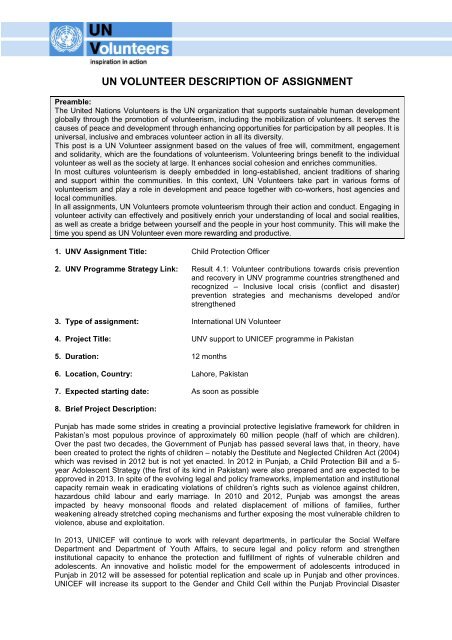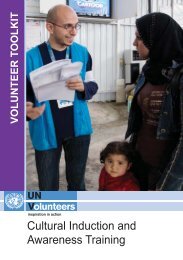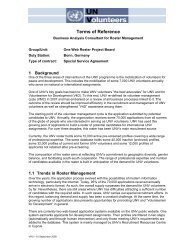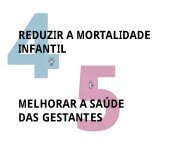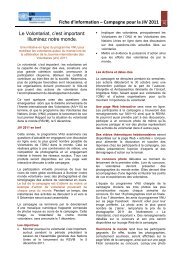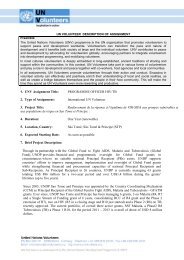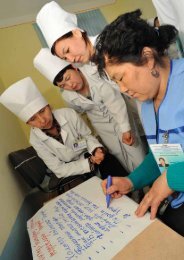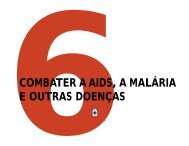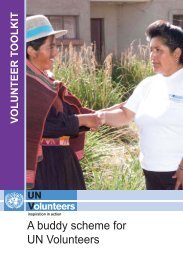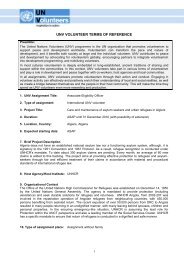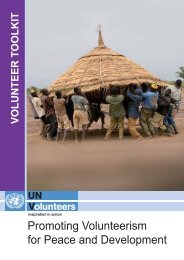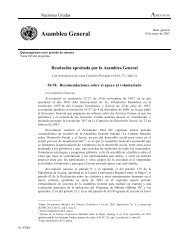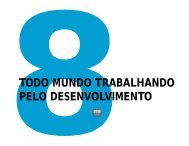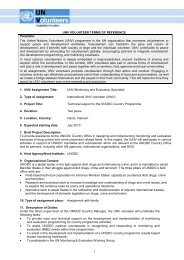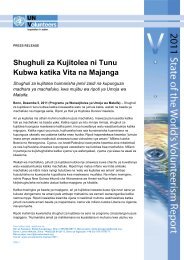UN VOLUNTEER DESCRIPTION OF ASSIGNMENT
UN VOLUNTEER DESCRIPTION OF ASSIGNMENT
UN VOLUNTEER DESCRIPTION OF ASSIGNMENT
You also want an ePaper? Increase the reach of your titles
YUMPU automatically turns print PDFs into web optimized ePapers that Google loves.
<strong>UN</strong> VOL<strong>UN</strong>TEER <strong>DESCRIPTION</strong> <strong>OF</strong> <strong>ASSIGNMENT</strong><br />
Preamble:<br />
The United Nations Volunteers is the <strong>UN</strong> organization that supports sustainable human development<br />
globally through the promotion of volunteerism, including the mobilization of volunteers. It serves the<br />
causes of peace and development through enhancing opportunities for participation by all peoples. It is<br />
universal, inclusive and embraces volunteer action in all its diversity.<br />
This post is a <strong>UN</strong> Volunteer assignment based on the values of free will, commitment, engagement<br />
and solidarity, which are the foundations of volunteerism. Volunteering brings benefit to the individual<br />
volunteer as well as the society at large. It enhances social cohesion and enriches communities.<br />
In most cultures volunteerism is deeply embedded in long-established, ancient traditions of sharing<br />
and support within the communities. In this context, <strong>UN</strong> Volunteers take part in various forms of<br />
volunteerism and play a role in development and peace together with co-workers, host agencies and<br />
local communities.<br />
In all assignments, <strong>UN</strong> Volunteers promote volunteerism through their action and conduct. Engaging in<br />
volunteer activity can effectively and positively enrich your understanding of local and social realities,<br />
as well as create a bridge between yourself and the people in your host community. This will make the<br />
time you spend as <strong>UN</strong> Volunteer even more rewarding and productive.<br />
1. <strong>UN</strong>V Assignment Title: Child Protection Officer<br />
2. <strong>UN</strong>V Programme Strategy Link: Result 4.1: Volunteer contributions towards crisis prevention<br />
and recovery in <strong>UN</strong>V programme countries strengthened and<br />
recognized – Inclusive local crisis (conflict and disaster)<br />
prevention strategies and mechanisms developed and/or<br />
strengthened<br />
3. Type of assignment: International <strong>UN</strong> Volunteer<br />
4. Project Title: <strong>UN</strong>V support to <strong>UN</strong>ICEF programme in Pakistan<br />
5. Duration: 12 months<br />
6. Location, Country: Lahore, Pakistan<br />
7. Expected starting date: As soon as possible<br />
8. Brief Project Description:<br />
Punjab has made some strides in creating a provincial protective legislative framework for children in<br />
Pakistan’s most populous province of approximately 60 million people (half of which are children).<br />
Over the past two decades, the Government of Punjab has passed several laws that, in theory, have<br />
been created to protect the rights of children – notably the Destitute and Neglected Children Act (2004)<br />
which was revised in 2012 but is not yet enacted. In 2012 in Punjab, a Child Protection Bill and a 5-<br />
year Adolescent Strategy (the first of its kind in Pakistan) were also prepared and are expected to be<br />
approved in 2013. In spite of the evolving legal and policy frameworks, implementation and institutional<br />
capacity remain weak in eradicating violations of children’s rights such as violence against children,<br />
hazardous child labour and early marriage. In 2010 and 2012, Punjab was amongst the areas<br />
impacted by heavy monsoonal floods and related displacement of millions of families, further<br />
weakening already stretched coping mechanisms and further exposing the most vulnerable children to<br />
violence, abuse and exploitation.<br />
In 2013, <strong>UN</strong>ICEF will continue to work with relevant departments, in particular the Social Welfare<br />
Department and Department of Youth Affairs, to secure legal and policy reform and strengthen<br />
institutional capacity to enhance the protection and fulfillment of rights of vulnerable children and<br />
adolescents. An innovative and holistic model for the empowerment of adolescents introduced in<br />
Punjab in 2012 will be assessed for potential replication and scale up in Punjab and other provinces.<br />
<strong>UN</strong>ICEF will increase its support to the Gender and Child Cell within the Punjab Provincial Disaster
Management Authority (‘PDMA’) in order to integrate Child Protection in Emergency within disasterrelated<br />
policies, planning, coordination and information management. In addition, a new provincial<br />
directorate of the National Commission of the Rights of the Child will be established in Punjab in 2013,<br />
and <strong>UN</strong>ICEF will provide technical support to an associated mechanism for monitoring, identifying and<br />
responding to violations of children’s rights.<br />
9. Host Agency/Host Institute: <strong>UN</strong>ICEF Pakistan, see http://www.unicef.org/pakistan/<br />
10. Organizational Context: <strong>UN</strong>ICEF Pakistan is working in the field of child protection in<br />
Pakistan.<br />
11. Type of Assignment Place: Non-family duty station<br />
12. Description of Duties:<br />
Within the terms of the organization’s delegated authority, and under the direct supervision of the Child<br />
Protection Specialist Lahore, reporting as well as to the Chief of the Field Office, Punjab, the <strong>UN</strong><br />
Volunteer will undertake the following tasks:<br />
<br />
<br />
<br />
<br />
<br />
<br />
Contribute to advocacy aiming at establishing a strong Child Protection system, including Child<br />
Protection in Emergency, in Punjab, as well as policy development/change and legislation to<br />
protect children from abuse, neglect and violence. Undertake field visits to monitor programmes,<br />
as well as conduct periodic programme reviews with government counterparts and other partners.<br />
Propose and/or undertake action on operational procedures affecting project management and<br />
implementation;<br />
Design, prepare, implement, monitor and evaluate children and adolescent-specific projects as<br />
assigned by the supervisor. Analyse and evaluate data to ensure achievement of objectives and/or<br />
take corrective action when necessary to meet project objectives. Contribute to the development<br />
and/or introduction of new approaches, methods and practices in project management and<br />
evaluation;<br />
Contribute towards preparation of the situation analysis by compiling data, analyzing and<br />
evaluating information and writing chapters of the analysis related to Child Protection Programme;<br />
Participate in inter-sectoral collaboration with other programmes in the development of the sectoral<br />
workplans, joint or convergent projects, ensuring the achievement of specific assigned objectives.<br />
Provide guidance and support to staff in meeting project objectives;<br />
Meet with national and international agencies covering the management of projects. Participate in<br />
meetings with ministries responsible for project review, and follow up on implementation of<br />
recommendations and agreements;<br />
Assist the government authorities in planning and organizing training programmes. Identify training<br />
needs and objectives for the purpose of capacity building, programme sustainability, as well as<br />
promotion and advocacy.<br />
Furthermore, <strong>UN</strong> Volunteers are encouraged to:<br />
<br />
<br />
<br />
<br />
Strengthen their knowledge and understanding of the concept of volunteerism by reading relevant<br />
<strong>UN</strong>V and external publications and take active part in <strong>UN</strong>V activities (for instance in events that<br />
mark International Volunteer Day);<br />
Be acquainted with and build on traditional and/or local forms of volunteerism in the host country;<br />
network and build relationships with loc al organizations, groups or individuals and support and/or<br />
participate in local volunteering initiatives; reflect on the type and quality of voluntary action that<br />
they are undertaking, including participation in ongoing reflection activities;<br />
Contribute articles/write-ups on field experiences and submit them for <strong>UN</strong>V publications/websites,<br />
newsletters, press releases, etc.; initiate and/or participate in local volunteer groups, including<br />
assisting them in submitting stories and experiences to the World Volunteer Web site;<br />
Promote or advise local groups in the use of online volunteering, or encourage relevant local<br />
individuals and organizations to use the <strong>UN</strong>V Online Volunteering service whenever technically<br />
possible;
Encourage, mobilize and support co-workers, fellow <strong>UN</strong> Volunteers and members of the local<br />
community to play an active part in peace and development activities on a voluntary basis;<br />
Discuss with supervisors how volunteerism for peace and development can be mainstreamed I the<br />
assignment and integrate activities promoting volunteerism for peace and development into work<br />
plans;<br />
Assist with the <strong>UN</strong>V “buddy programme” for newly-arrived <strong>UN</strong> Volunteers.<br />
13. Results/Expected Output:<br />
<br />
<br />
<br />
<br />
<br />
Efficient, timely, responsive, client-friendly and high-quality support rendered to the Child<br />
Protection team (2 national staff in Punjab);<br />
Protection and empowerment of adolescents model is assessed and documented for potential<br />
replication and scale-up;<br />
Monitoring and reporting on patterns of child rights violations in Punjab province is enhanced;<br />
Child Protection in Emergency is effectively integrated in the Punjab PDMA’s preparedness<br />
planning and capacity building modules for 2013;<br />
A final statement of achievements towards volunteerism for development during the assignment,<br />
such as reporting on the number of volunteers mobilized, activities participated in and capacities<br />
developed.<br />
14. Qualifications/Requirements:<br />
a) Qualifications, skills, experience:<br />
The incumbent must be a dynamic, multi-functional person, who supports <strong>UN</strong>ICEF’s Child Protection<br />
Unit with professionalism, dedication and client orientation. The following qualifications are required:<br />
<br />
<br />
<br />
<br />
<br />
<br />
<br />
<br />
<br />
<br />
<br />
Bachelor’s or Master’s Degree in the social sciences, education, development studies, public<br />
policy, international human rights, op similar field;<br />
Demonstrated experience working with/for children;<br />
Knowledge of latest developments and approaches in the field of Human Rights and Child Rights,<br />
Monitoring and Evaluation, and programme management;<br />
Good negotiation, presentation, and advocacy skills;<br />
Demonstrate and share technical knowledge and expertise;<br />
Demonstrated research experience;<br />
Experience in developing programmes and project proposals according to standard Logical<br />
Frameworks;<br />
Excellent English and high level ability to draft clearly and concisely on technical issues;<br />
Computer skills: Microsoft Office, with demonstrated skills in database management with Excel;<br />
Sound security awareness;<br />
Have affinity with or interest in development, humanitarian relief, post-conflict situations,<br />
volunteerism as a mechanism for durable development, and the <strong>UN</strong> System.<br />
b) Competencies and values:<br />
<br />
<br />
<br />
<br />
Integrity and professionalism: demonstrated expertise in area of specialty and ability to apply good<br />
judgment; high degree of autonomy, personal initiative and ability to take ownership; willingness to<br />
accept wide responsibilities and ability to work independently under established procedures in a<br />
politically sensitive environment, while exercising discretion, impartiality and neutrality; ability to<br />
manage information objectively, accurately and confidentially; responsive and client-oriented;<br />
Accountability: mature and responsible; ability to operate in compliance with organizational rules<br />
and regulations;<br />
Commitment to continuous learning: initiative and willingness to learn new skills and stay abreast<br />
of new developments in area of expertise; ability to adapt to changes in work environment;<br />
Planning and organizing: effective organizational and problem-solving skills and ability to manage<br />
a large volume of work in an efficient and timely manner; ability to establish priorities and to plan,<br />
coordinate and monitor (own) work; ability to work under pressure, with conflicting deadlines, and<br />
to handle multiple concurrent projects/activities;
Teamwork and respect for diversity: ability to operate effectively across organizational boundaries;<br />
ability to establish and maintain effective partnerships and harmonious working relations in a multicultural,<br />
multi-ethnic environment with sensitivity and respect for diversity and gender;<br />
Communication: proven interpersonal skills; good spoken and written communication skills,<br />
including ability to prepare clear and concise reports; ability to conduct presentations, articulate<br />
options and positions concisely; ability to make and defend recommendations; ability to<br />
communicate and empathize with staff (including national staff), military personnel, volunteers,<br />
counterparts and local interlocutors coming from very diverse backgrounds; capacity to transfer<br />
information and knowledge to a wide range of different target groups;<br />
Flexibility, adaptability, and ability and willingness to operate independently in austere, remote and<br />
potentially hazardous environments for protracted periods, and including possible extensive travel<br />
within the area of operations; willingness to transfer to other duty stations within area of operations<br />
as may be necessary;<br />
Genuine commitment towards the principles of voluntary engagement, which includes solidarity,<br />
compassion, reciprocity and self-reliance; and commitment towards the <strong>UN</strong> core values.<br />
15. Living Conditions:<br />
Pakistan is situated in South Asia. Located along the Arabian Sea, it is surrounded by Afghanistan to<br />
the west and northwest, Iran to the southwest, India to the east, and China to the northeast. Pakistan<br />
has an extremely varied geographical outlook, including mountains, deserts, major rivers and the sea.<br />
Pakistan experiences frequent earthquakes, occasionally severe, especially in north and west.<br />
The climate is generally characterized by hot summers and cool or cold winters. From June to<br />
September, most of the country is lashed by the South-West Monsoon, which leads to heavy rainfall<br />
and high humidity. Islamabad has a humid subtropical climate, with hot summers accompanied by a<br />
monsoon season followed by fairly cold winters. The hottest months are May and June, where average<br />
highs routinely exceed 38 °C (100.4 °F).<br />
Pakistan is a non-family duty station. A NOC is required to visit Khyber Pakhtunkhwa areas which<br />
should be applied at least 2 weeks in advance. A police escort is required to travel to all the floodaffected<br />
areas. Petty crimes and muggings are fairly common though less in Islamabad. Use common<br />
sense. Registration with home embassy is highly recommended.<br />
Pakistan is a conservative country and it is advisable for women to wear long skirts or trousers in<br />
public (Pakistani women wear the traditional shalwar kameez, but in the big cities, women wearing<br />
jeans and khakis is not very uncommon sight, especially in casual settings, shopping malls and around<br />
picnic spots). Dress codes for men are more lax, though shorts are uncommon. Men should never<br />
shake hands with or touch a woman they don't know very well. As with most of South Asia, the right<br />
hand is used for eating, shaking hands and giving or receiving everything (including money), while the<br />
left hand is reserved for handling shoes and assisting in toilet duties. Discussion about religion and<br />
Islam should remain respectful and positive.<br />
State of the art health facilities are available throughout the country and especially Islamabad. Dental<br />
care facilities are also available. There are no mandatory vaccines required to travel to Pakistan.<br />
Currently dengue fever is on the rise in Pakistan, especially in Punjab. Mosquito repellents are<br />
recommended.<br />
Most staple foods can be found in the markets, including rice, meat, vegetables, cooking oil, salt and<br />
sugar. There are many local markets around Islamabad as well as various supermarkets that are<br />
stocked with imported goods. Islamabad has a large number of restaurants and cafes. There is a<br />
variety of food ranging from Western to South Asian fare. You can also find several local dhabas with<br />
less expensive meals. The price range for a meal can range from $3 to $20+. Tap water is not<br />
advisable; bottled water is available almost everywhere. Using alcoholic drinks in public is illegal.<br />
There is one major fixed line provider (PTCL) and 5 cellular companies (Mobilink, Ufone, Telenor,<br />
Warid and Zong). Call rates vary but are extremely cheap for some Western countries. All cellular<br />
operators in Pakistan use GSM platform. Cybercafés can be found on virtually every street corner and
the rates are as low as Rs.15-20 per hour. Most of the cafes have a decent speed internet connection,<br />
but not always fast operating systems.<br />
The <strong>UN</strong>V Country Office (based in <strong>UN</strong>DP) will help arrange your initial accommodation, at your<br />
expense (Settling-in Grant is foreseen for this). Most of the guest houses in Islamabad are aimed at<br />
internationals and offer a good level of comfort with air-conditioned rooms and en-suite bathrooms.<br />
Average cost is US$ 50 to 80 per night.<br />
International <strong>UN</strong> volunteers are required to reside in a MORSS compliant residence. Secure and<br />
comfortable permanent accommodation can be found in Islamabad but cost will generally depend on<br />
distance from the city centre and number of rooms. Sharing an accommodation with another<br />
international colleague is also possible. Rent may start from US$ 800 onward. Power outages are<br />
frequent and installation of electricity generator is required as per MORSS. Generally there is no water<br />
shortage in Islamabad.<br />
Current US dollar exchange rate is 1 USD = PKR 97. In order to receive payments locally, <strong>UN</strong>V unit<br />
will help you open a bank account with Standard Chartered Bank. This will be a paired account where<br />
you can use it both for US dollar as well as Pak Rupee. ATM machines can be found throughout the<br />
country.<br />
15. Conditions of Service<br />
The assignment is funded for 12 months. An extension may be possible depending on availability of<br />
(donor) funding, operational necessity and satisfactory performance. However, there is no expectancy<br />
of renewal of the assignment, in accordance with art. 5.4 <strong>UN</strong>V COS.<br />
Settling-In-Grant is provided. Monthly Volunteer Living Allowance (VLA) – intended to cover housing,<br />
utilities, and normal cost-of-living expenses is USD 2,244. Life, health and permanent disability<br />
insurances are included and resettlement allowance. <strong>UN</strong>V will provide a copy of the <strong>UN</strong>V Conditions of<br />
Service to the successful candidate together with the offer of assignment.<br />
<strong>UN</strong>V will provide a copy of the <strong>UN</strong>V Conditions of Service to the successful candidate together with<br />
the offer of assignment.<br />
16. Application<br />
If you are not yet registered in the <strong>UN</strong>V database, please apply by completing the <strong>UN</strong>V web<br />
application at the following link: http://one.unv.org/main/?Lang=en Important: please select the<br />
following code from the drop down menu on the first page of the application: “13FFGER_PAK” If you<br />
are registered in the <strong>UN</strong>V database, please update your profile at: http://MyProfile.unv.org , click on<br />
the “Special Recruitment” option on the left menu, then click on the “Edit” button and select the<br />
advertisement code “13FFGER_PAK” from the drop-down list.<br />
This assignment is funded by the Government of Germany, therefore applications from German<br />
nationals are expressly encouraged.<br />
Closing Date: 12 March 2013. Only short-listed candidates will be contacted.


